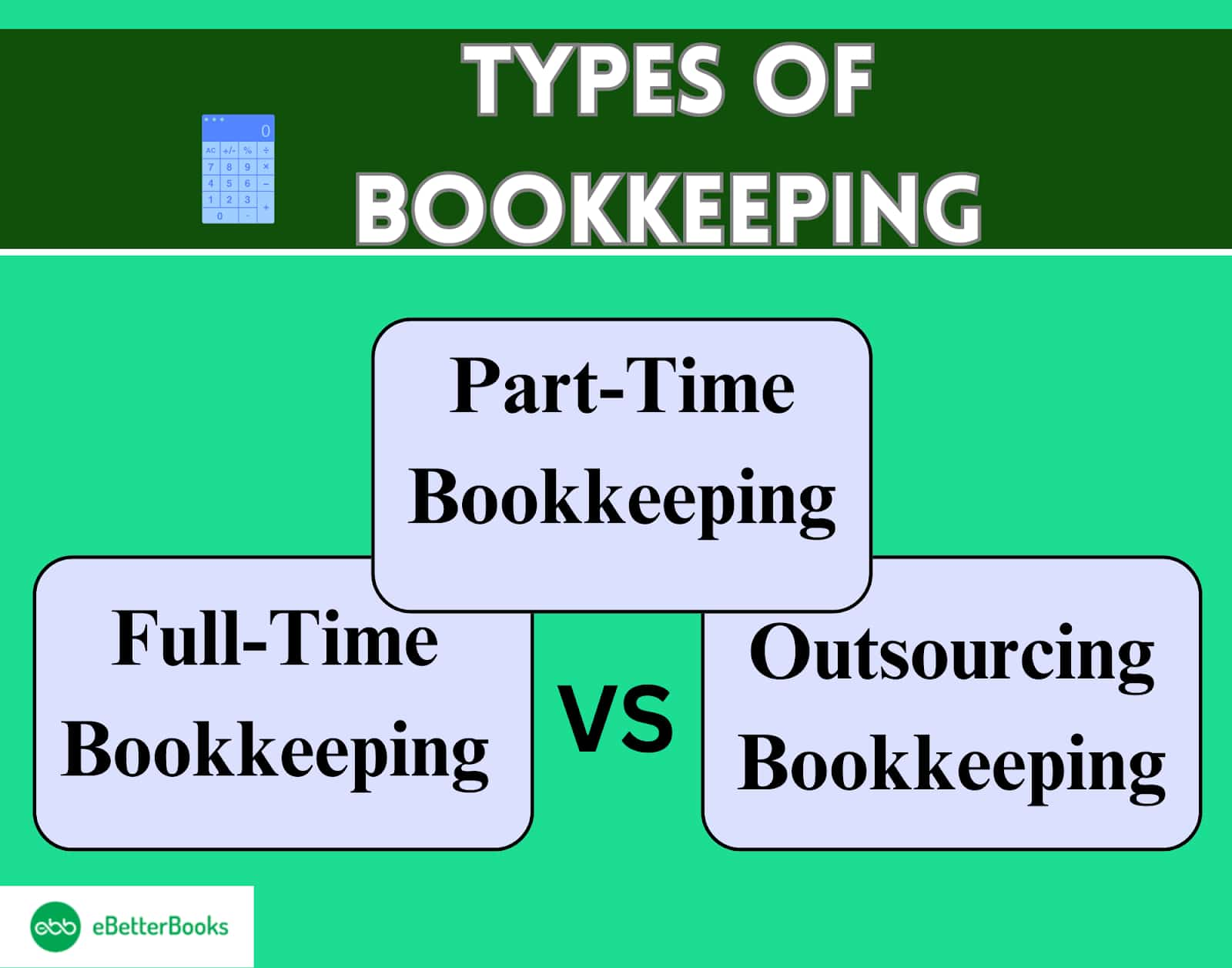The cost of monthly bookkeeping services varies between $300 to $2,500, although freelancers and virtual assistants are cheaper than internal bookkeeping services.
The cost varies depending on factors such as the size of your business, the number of transactions, and whether you hire an in-house bookkeeper or freelancer or opt to use outsourced virtual bookkeeping services per month.
What is Bookkeeping?
Bookkeeping involves the daily recording of your company’s financial transactions in an organized system of accounts. Maintaining accurate records is crucial for businesses to make informed decisions about operations, investments, and finances.
Bookkeeping systems can be categorized into two main types. We looked at the two important methods used in accounting, the single entry and the double entry systems, which are appropriate to different types of business.
Single-Entry Bookkeeping System
The single-entry system is easy to understand and involves posting entries as single entries in an account, just like a check books.
The simplified system makes it ideal for small businesses or businesses owned by a single person with simple operations.
The use of this system is rather simple, and knowledge of bookkeeping is needed to get a grasp of the program.
Advantages:
- Easy to implement and understand.
- Cost-effective for businesses with limited financial activities.
Disadvantages:
- Provides limited financial analysis and insights.
- Needs to track assets, liabilities, or equity comprehensively.
- Prone to inaccuracies and errors.
Double-Entry Bookkeeping System
The double-entry bookkeeping system in which every transaction affects two accounts, at least one of which is an asset or expense account and the other is a liability or equity account or income account, maintains the accounting equation of Assets = Liabilities + Equity.
Advantages:
- Offers detailed insights into a business’s financial health.
- Helps prepare accurate financial reports.
- Minimizes the chances of errors.
Disadvantages:
- More complex and time-consuming to implement.
- Requires bookkeeping expertise.
- Best suited for larger or more complex businesses.
What a Bookkeeper Does for a Small Business
A small business bookkeeper performs several important tasks so the records remain accurate and properly documented.
Their responsibilities typically include:
- Collect outstanding money from customers and pay bills from suppliers.
- Treasury activities encompass the processing of payments to suppliers, vendors, and invoices.
- Management of client’s invoices and their payment.
- To reinforce its position in supporting the payroll processing function.
- Closing the organizational accounts.
- Controlling the facilities of online banking transactions.
- Conducting cash flow analysis.
- Generating financial reports.
Importance of Bookkeeping
Accounting is important in business and organizational development, fund management, and tax computation.
Here are six key reasons why bookkeeping is vital for your business:
- Aids in Accurate Budgeting: Assists in developing budgeting and monitoring schemes derived from concrete fiscal information.
- Keeps You Tax Prepared: It ensures compliance with tax laws and eases the process of filing taxes.
- Keeps Records Organized: Allows users a more efficient interpretation of certain financial data in decision-making by providing an outlined perspective of the information.
- Makes Business Goals Clearer: This enables an assessment of the organization’s financial goals and objectives.
- Ensures Compliance with Laws and Regulations: Reminds the business of its obligations in relation to the law.
- Offers Peace of Mind: Facilitates business owners to let the finances stay in order while covering aspects that may not be of their core concern when expanding the business.
Bookkeeper Cost: Part Time vs. Full Time vs. Outsourced

For many new businesses, simple bookkeeping tasks are first handled by the owners themselves. This helps a firm to make a cost-efficient decision.
However, when you begin devoting a lot of time to the expansion of your enterprise, you will get bored with the bookkeeping chores.
- Part-Time Bookkeeper
Employing part-time bookkeepers means that they perform relatively small jobs. They enter expenses, monitor schedules, and such. Employers usually delegate this part-time bookkeeping duty to personnel who undertake the role of office managers or promote specific staff to handle the duties.
- Hourly Rate: From $20
- Monthly Cost: $400 and $800
- Best For: Companies of limited size and those that may need assistance several days a week.
- Full-Time Bookkeeper
Full-time bookkeepers manage daily transactions, financial records, revenue, taxes, credit cards, customer billing statements, monthly activities, and much more.
They will help you maintain the order of your books and also help your business to have the financial capacity to operate. Full-charge bookkeepers can also handle payroll for owners of medium to large businesses.
- Monthly Salary: $2,500 to $6,000
- Best For: Small businesses that require to have strong and constant bookkeeping in their financial processes.
Outsourcing bookkeeping is beneficial if you could really use some assistance in hiring a bookkeeper to record some of your financial transactions.
Flexibility is among the various advantages of this approach, as you can specify the type and extent of services needed from the bookkeeper.
Smaller businesses are the most likely to outsource their bookkeeping functions to other parties. The principal advantage of outsourcing, of course, is cost.
- Monthly Packages: $3,000 to $4,500
- Best For: Companies that do not have Human Resource departments to employ full-time bookkeepers but require affordable methods of accounting.
| Characteristics | Part-Time Bookkeeping | Full-Time Bookkeeping | Outsourced Bookkeeping |
| Who are they? | Ideal for businesses needing occasional accounting help. | Best for small to medium businesses needing full accounting control. | Suitable for small to medium businesses that need scalable, full-service accounting. |
| What do they do? | Handles tasks like entering receipts, monitoring accounts payable/receivable | Manages tasks like invoicing, payroll, financial reporting, and month-end processing. | Provides full-service accounting and can scale as the business grows. |
| What price do they charge? | $15–$20 per hour depending on location. | $35,000–$55,000 annual salary plus perks | $500–$2,500 per month, depending on complexity. |
| Which business size do they serve? | Small to medium-sized businesses. | Small to medium-sized businesses. | Small to medium-sized businesses. |
Factors Affecting Bookkeeping Costs
- Transaction Volume: Increasing the number of transactions leads to time and cost implications.
- Scope of Services: Simple ledgering and records upkeep versus comprehensive accounting services (such as payroll processing, tax submissions/reports preparation, and preparation of financial summaries) affect the firm’s rate of charging for services.
- Business Size & Complexity: Some industries are more complicated than others, and organizations with larger financial structures need more assistance, increasing expenses.
- Location: It is right to expect that the estimated salaries and rates will be different in various regions, primarily because of the differences in the cost of living.
- Software & Technology: Extra charges may be incurred for the installation of particular software or other equipment.
- Experience & Expertise: Advanced bookkeepers demand higher fees for their services because they are knowledgeable and can tackle intricate duties.
- Outsourcing vs. In-House: Companies that outsource bookkeeping enjoy the benefits of empirical cost more than when they employ permanent employees.
How Much Does It Cost To Hire A Bookkeeper?

You may get your books done properly in one of three ways: by hiring a bookkeeper in-house, using a Keeper Tax, or outsourcing an online bookkeeping service for your business.
Let’s check each of them:
| Properties | In-House bookkeepers | Outsourced bookkeepers | Keeper Tax |
| Best For | Large corporations having a large number of workers, complicated financial systems, or a high volume of daily transactions | Small-to-medium businesses | Freelancers, gig workers, independent contractors and other sole proprietors |
| Monthly Cost | $3,200 – $3,520 | $250-$1,500 | $16 |
If you want to know the Cost of Hire A Bookkeeper State Wise in the USA, then check the below table:
| Typical Rates Charged by Bookkeepers State Wise in the USA | |
| State | Hourly mean wage |
| California | $24.56 |
| Texas | $ 20.56 |
| Florida | $20.41 |
| New York | $24.38 |
| Pennsylvania | $21.38 |
Let’s connect with Best Bookkeeping Services in Baltimore
FAQs!
Is a Bookkeeper Cheaper than an Accountant?
The industry and required degree of knowledge are the main determinants of this decision; however, a bookkeeper often costs less to hire.
What Does a Full-Charge Bookkeeper Do?
Full charge refers to managing all the company’s accounting requirements by these bookkeepers. These bookkeepers record complicated transactions, compile financial statements and tax returns, manage timesheets and payroll, and manage the company ledger.
What are Bookkeeping Costs?
There are several hourly rates available at the market rate: The hourly rate for bookkeepers ranges from $30 to $90; the hourly rate for accounting services performed by a CPA ranges from $150 to $450.
Do You Need a Bookkeeper for Your Business?
You may or may not need a bookkeeper, depending on the size of your business and its complexity, as well as your own financial experience. If you are dealing with simple transactions, it is likely that you are dealing with them. But as the business expands, it is crucial to hire a bookkeeper who would facilitate bookkeeping, taxes, and overall sound financial management and leave you to manage, for instance, the core activities of the business.
Do I Need an Accountant if I Have a Bookkeeper?
Although most start-up firms don’t engage accountants until they are established, you would need to do so later on, even though you would first require a bookkeeper rather than an accountant.
What is Included in Full-Service Bookkeeping?
A full-service bookkeeper will manage activities such as paying bills, billing customers, handling timesheets and payroll, and preparing financial statements at the end of the month.
How Much Should a Bookkeeper Charge?
The hourly wage for individual bookkeepers typically varies from $29.21 to $43.40. This sum may be greater or less than the national average of $37 per hour based on where you live.

